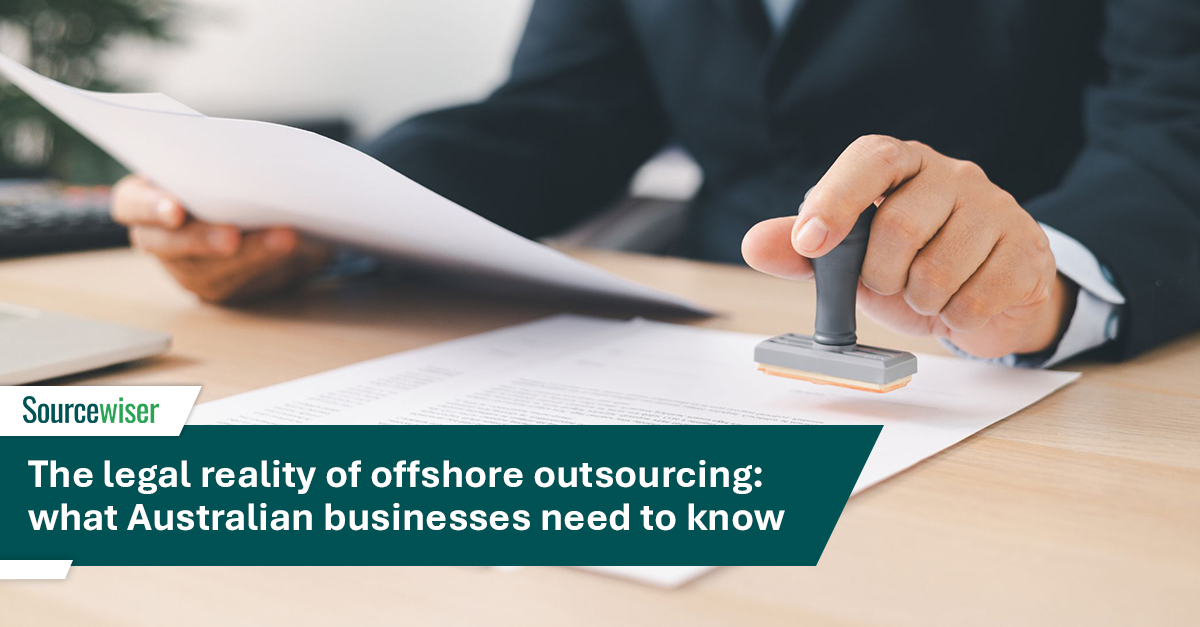Outsourcing to the Philippines has grown into a $30+ billion industry, making it one of the world’s most mature global outsourcing destinations. The country’s large English-speaking workforce, cultural compatibility with Western markets and reputation for strong work ethic have made it a top outsourcing destination for global organisations.
But with so many providers in the market - especially operating in the Philippines - the challenge isn’t whether to outsource - it’s who to outsource with.
The risks of choosing the wrong outsourcing partner
Outsourcing can unlock major advantages like cost savings, scalability and access to specialised, global talent. But when the wrong partner is chosen, the consequences can be significant. These include:
-
High turnover and poor retention: if staff aren’t a good fit, you’ll face constant re-hiring, knowledge loss and reduced productivity.
-
Hidden costs: rigid contracts, unexpected fees and misaligned pricing models often erode the cost savings outsourcing promises.
-
Security vulnerabilities: weak data protection policies or lack of compliance can expose you to breaches, fines and reputational damage.
-
Slow onboarding and poor integration: without proper cultural and technical alignment, offshore teams struggle to add value quickly.
-
Loss of trust and continuity: every mis-hire or failed provider switch disrupts delivery, erodes internal confidence and slows momentum.
In fact, studies show that nearly half of all outsourcing relationships fail within the first five years, most often due to misaligned expectations and poor provider selection.
The good news? These risks are avoidable if you know what to look for. In this blog we explore the importance of compliance and the six key differentiators that separate high-performing outsourcing partners from the rest.
The compliance factor
While the benefits such as cost savings from outsourcing are clear; the compliance risks are less visible - but just as real. Misclassification of workers, unclear contracts or weak governance can expose businesses to lawsuits, fines and reputational damage. Strong outsourcing partners embed compliance into their delivery model from the start, offering frameworks such as Employer of Record (EoR) arrangements, local entity support and transparent contracts to ensure offshore teams are both productive and legally protected.
Consider the recent Fair Work ruling in Australia, Pascua v. Doessel Group Pty Ltd, which highlights just how important compliance has become in the global outsourcing landscape.
The case involved a Filipino contractor performing legal and administrative work remotely. The Fair Work Commission determined that despite being labelled as a contractor, the worker was in fact an employee under Australian law - because the role demonstrated control, integration and ongoing responsibilities.
This ruling is a wake-up call for global businesses, showing that remote workers performing essential tasks may still be legally considered employees, that misclassification risks extend across borders and that robust governance frameworks are essential to remain compliant.
The lesson? Choose an outsourcing partner who understands compliance obligations and can structure engagements to meet local and international requirements while keeping teams integrated and effective.
Six key things to look for in an outsourcing partner
1. Curated hiring vs. bench filling
One of the biggest mistakes businesses make is partnering with providers that ‘bench-fill’ - pushing pre-screened CVs without understanding your culture or workflows. Research shows that 70% of outsourcing failures stem from poor talent fit and integration challenges. Instead, look for a provider who prioritises curated hiring:
-
Aligns with your business goals and workflows before sourcing.
-
Selects from the top tier of talent, not just available candidates.
-
Prioritises cultural alignment to reduce turnover and speed up onboarding.
Curated hiring reduces turnover and accelerates value from day one.
2. Tech-readiness as a standard
Today’s outsourcing can’t just be about cost savings. Businesses need talent trained on AI-enabled workflows, automation and modern platforms. A Deloitte Global Outsourcing Survey (2024) highlighted that 65% of organisations outsource specifically to gain access to new digital capabilities - not just reduce expenses.
Your outsourcing partner should provide teams that are vetted to be platform-ready from day one, enabling you to stay competitive without months of retraining. Tech-ready teams help you stay competitive without long onboarding delays.
3. Flexibility for changing needs
Rigid contracts and one-size-fits-all pricing models are outdated. Flexibility is now a core expectation of many organisations looking to outsource. According to PwC, organisations that adopt flexible outsourcing models report up to 30% greater ROI compared to those locked into fixed contracts.
Look for a partner who offers:
-
Hourly/project-based pricing for variable workloads
-
FTE models for predictable growth
-
Value-based and subscription models for outcome-driven delivery
Flexible pricing keeps you in control of costs and maximises ROI - when guided by a compliance-led approach - at every stage of growth.
4. Specialisation beyond call centres
The Philippines is globally recognised for customer service, but leading organisations are now outsourcing a wide range of complex back-office and knowledge-intensive roles - from finance and marketing to analytics and IT.
McKinsey notes that knowledge process outsourcing (KPO) is one of the fastest-growing segments in the Philippines, driven by demand for domain expertise and trust-based roles.
A partner specialised in non-customer-facing teams ensures your IP and processes are safeguarded, while freeing your onshore staff to focus on innovation and growth.
5. Retention as a growth driver
High turnover is one of the biggest risks in outsourcing. Every time a team member leaves, you lose not just skills, but also institutional knowledge.
That’s why retention should be a key metric when evaluating providers. Providers that invest in employee engagement, training and career pathways often achieve attrition rates 30 - 40% lower than industry averages. This directly translates into greater continuity, stronger performance and better ROI for your business.
6. Data security and compliance
When outsourcing, one of the most important questions every business should ask is: “How safe is my data?” In fact, according to PwC, over 60% of businesses rank data security as their number one outsourcing concern.
In industries like financial services, healthcare and technology, a single breach can damage customer trust and create regulatory headaches. That’s why data security should be a core selection criterion when choosing an outsourcing partner.
Providers that treat security as a checkbox put your IP and operations at risk. The strongest partners apply security by design, embedding controls across people, processes and technology. Choosing a partner with robust, layered protections gives you confidence that your data, systems and operations remain protected - without slowing down growth.
Next steps …
Choosing the right outsourcing partner in the Philippines isn’t simply about cutting costs - it’s about building a relationship that helps you scale sustainably, adapt to change and access world-class talent.
By prioritising curated hiring, tech-readiness, flexible pricing, data security, compliance and retention, you can ensure your outsourcing partner becomes a long-term strategic asset - not just a vendor.
Download our Outsourcing partner checklist to compare providers and help you make the right choice.



